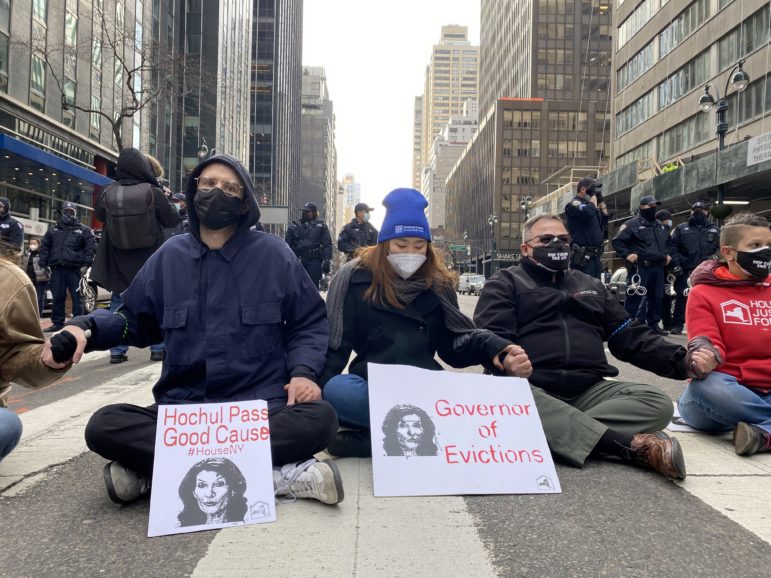“New York can address our perennial housing crisis, but only if we tax the rich and prioritize the public interest over private gain.”

David Brand
Housing activists rallied for state lawmakers to pass “good cause” eviction legislation in January.On April 1, our leaders in Albany missed their deadline to decide our state’s budget and left millions of tenants across New York facing double-digit rent hikes or the threat of an eviction at any moment. With over 78,000 New Yorkers unhoused and more than half of New Yorkers unable to afford rent, our state is facing a severe housing crisis that grows most urgent by the day.
In response, Gov.Kathy Hochul and the state legislature have introduced plans that promise to spur housing development. While plans to build more housing sound good in theory, both the governor’s and the legislature’s proposals are woefully insufficient at tackling both our near-term and long-term housing needs. To truly address our housing needs we need to tax the rich and invest in stronger tenant protections, homelessness prevention programs, public and social housing, and programs that guarantee stable housing for all New Yorkers.
Strengthen tenant protections and homelessness prevention
Post-pandemic New York is facing both a rise in evictions and a historic homelessness crisis, due in part to New York’s weak tenant protections and chronic disinvestment in tenant support. Neither Hochul’s plan nor the legislature’s invest directly or at the scale required to prevent further evictions or keep people in their homes.
Tenant groups have a plan to provide immediate relief to these crises through Good Cause Eviction protections and the Housing Access Voucher Program (HAVP). Good Cause would provide currently unprotected market-rate tenants with a right to a lease renewal and protection against unreasonable rent increases while HAVP would invest $250 million in housing assistance for those currently experiencing homelessness or on the verge of eviction.
Besides these bills, which are already in the legislature’s budgets, the clearest path to invest in housing stability is through a statewide expansion of Right to Counsel laws. These would guarantee that every tenant facing an eviction in New York State has access to a lawyer to act in their defense.
After New York City adopted this type of program, the proportion of tenants represented by a lawyer in eviction court grew from 1 percent to 74 percent, with 84 percent of those represented able to stay in their homes. Proponents estimate the total cost of this program to be a mere $172 million — just 38 percent of what Gov.Hochul plans to lend to re-build horse racing facilities on Long Island.
READ MORE: What Would It Take To Fully Fund Right To Counsel For NYC Tenants?
Invest in public and social housing
Nearly 340,000 people live in New York City public housing, yet neither Gov.Hochul nor the legislature propose to invest in it sufficiently. Public housing is unequivocally the state’s most crucial resource for housing its most vulnerable residents. Despite a massive and growing need for capital funds and an urgent operating funds deficit, Hochul’s Housing Compact entirely ignores the needs of New York’s public housing tenants. The legislature’s One-House budget aims to correct this oversight, but provides a mere $350 million to address issues which will take billions to resolve.
Residents to Preserve Public Housing and other supporters have called for $6.2 billion in capital and operating funds for the New York City Housing Authority (NYCHA) in the state budget, alongside $589 million to forgive all public housing residents’ rent arrears statewide. This is how we can ensure comprehensive repairs at NYCHA complexes without resorting to privatization, stabilize the operations of our public housing authorities, and offer a clean slate for thousands of tenants who were ineligible for relief through the Emergency Rental Assistance Program (ERAP).
The Tenant Opportunity to Purchase Act (TOPA) has also fallen on deaf ears. This is a powerful mechanism to curb real estate speculation, empower renters to take control over their homes, and remove housing from the predatory private market. What has emerged from Albany instead is a vague proposal for homeownership funds. While the spirit of this proposal is welcome, its unspecific language risks defanging the transformative potential of TOPA and disappointing the many New Yorkers who are demanding greater leverage over their slumlords with the power of resident control.
Choose abundance, not austerity
Our leaders in Albany have often stifled these kinds of robust investments with one simple question: “But how will we pay for it?”Instead of identifying resources they offer the path of austerity, clothed in the language of fiscal prudence.
But both Hochul’s and the Legislature’s budgets leave billions in potential state revenue on the table. Advocates have a plan for that too. Through its proposals for tax increases on the ultra-wealthy, the Tax the Rich platform would raise enough revenue to fund all of the programs mentioned and much more. This platform shows that fiscal austerity is not a necessity, it’s a political choice.
Achieving housing security for working-class people requires urgent action, it requires recognizing the experiences and ideas of tenants and affordable-housing advocates, and above all it requires public investment. Our leaders need to follow the tenant movement’s lead. New York can address our perennial housing crisis, but only if we tax the rich and prioritize the public interest over private gain. Housing is a human right, it’s time we make that a reality in New York State.
Rodrigo Camarena is an organizing committee member of NYC-DSA’s Housing Working Group, a Housing Justice for All and Tax the Rich: Seize Our Future Coalition Partner









One thought on “Opinion: It’s Time to Tax the Rich and Make Housing Justice a Reality in New York ”
The ‘rich’ can and are leaving New York for Florida and other lower-tax states. Good Cause Eviction is unconstitutional because it forces a private property owner to endlessly renew a lease on their private property against their will.